Fears are mounting that Britain could be plunged into a ‘de facto lockdown’ in the New Year because so many people will be sick with the Covid variant.
The Prime Minister’s Official Spokesman said it was ‘valid’ to assume the UK could face 1million daily cases of the so-called ‘Omicron’ strain by next month – the equivalent of one in every 66 people catching the virus each day.
The variant has become dominant in London, with the capital’s Covid infection rate spiralling by 55 per cent in two weeks to 537 cases per 100,000 people – the highest level since January, when stringent curbs were in place. Hospitalisations have risen by 50 per cent over the same period, from 90 to 140 admissions a day.
Though deaths are currently flat, it can take up to a month for fatalities to start rising due to time it takes to fall seriously ill.
MPs tonight approved controversial Plan B restrictions on Covid passports and compulsory facemasks. The Commons also signed off the tighter rules on face coverings by 441 to 41, and ‘nodded through’ changes to replace isolation rules with daily testing for the fully vaccinated.
But Boris Johnson failed to quell the biggest Tory rebellion of his premiership as around 100 backbenchers defied the whip and mutinied over the Covid passes – more than the 80 expected to vote down the curbs. Earlier today, the Prime Minister had made a last-gasp attempt to win round his MPs as he addressed the 1922 Committee of Conservatives shortly before the Commons vote, telling them ‘we have absolutely no choice’ to impose the measures.
England’s chief medical officer, Professor Chris Whitty, is said to have warned the Cabinet during a stark Covid update this afternoon that astronomical infection rates will spark staff shortages in pubs, restaurants and shops. There are now concerns of a repeat of the so-called ‘pingdemic’ that led to the shutdown of whole swathes of the economy over the summer as millions of health people were forced to self-isolate at home.
Prof Whitty also warned that the UK was braced for a ‘significant increase in hospitalisations’, as NHS bosses ordered hospitals to discharge as many patients as possible off wards and into care homes and even hotels to handle the expected surge.
Health chiefs are already calling for tighter restrictions in London, while in Scotland, Nicola Sturgeon limited social mixing to three households in the run up to Christmas.
Hospitals are on red alert in the wake of frightening Government modelling that warned admissions could exceed levels seen during the second wave last January, when 4,000 infected patients were needing medical care every day.
However, the first major real-world study of the variant – conducted in South Africa – found that Omicron is causing a third fewer hospital admissions than the Delta variant. The study also found that just two doses of the Pfizer vaccines provides 70 per cent protection against severe illness. South African doctors have accused the government in London of overreacting to Omicron, with hospital admissions in the African country running at just 380 per day and signs the outbreak has peaked already.
Public health officials in the UK estimate the true number of daily Omicron infections is around 200,000 and that the mutant virus is doubling every two days. Their estimates are based on mathematical modelling that is widely disputed.
On another dramatic day of the coronavirus crisis:
- The Omicron variant has become dominant in London barely two weeks after it was first detected, health chiefs revealed today;
- But Omicron is causing milder disease than Delta in patients in the epicentre of the new Covid variant, the first major real-world study in South Africa confirmed;
- Dr Susan Hopkins, chief medical adviser at the UK Health Security Agency, said vaccine passports, WFH and other curbs will be needed for ‘the next four to eight weeks’ to prevent the NHS from being ‘overwhelmed’ by the Covid variant;
- Sajid Javid and his top health advisers were today accused of scare-mongering after clarifying that gloomy models do estimate that 200,000 Britons could be catching Omicron every day;
- Nicola Sturgeon re-introduced social distancing and asked Scots to cut down on socialising in the run up to Christmas today;
- Care bosses have warned homes will not have enough staff to deal with NHS orders for hospitals to discharge as many patients as ‘soon as practically possible’ to handle the expected Omicron surge;
- Mr Javid today confirmed all countries will be removed from the Government’s international travel red list from 4am tomorrow because Omicron is already running rampant in the UK;
- A new super-variant could be created if Omicron and Delta infect someone at the same time, one of Moderna’s bosses has warned;
- The Department of Health reported 59,610 overall coronavirus cases in the past 24 hours, up more than 30 per cent in a week and the highest number since the peak of the second wave on January 9.
- Daily deaths were down 17 per cent in a week with 150 victims today, while latest hospital data shows there were 793 last Friday, up 11 per cent.
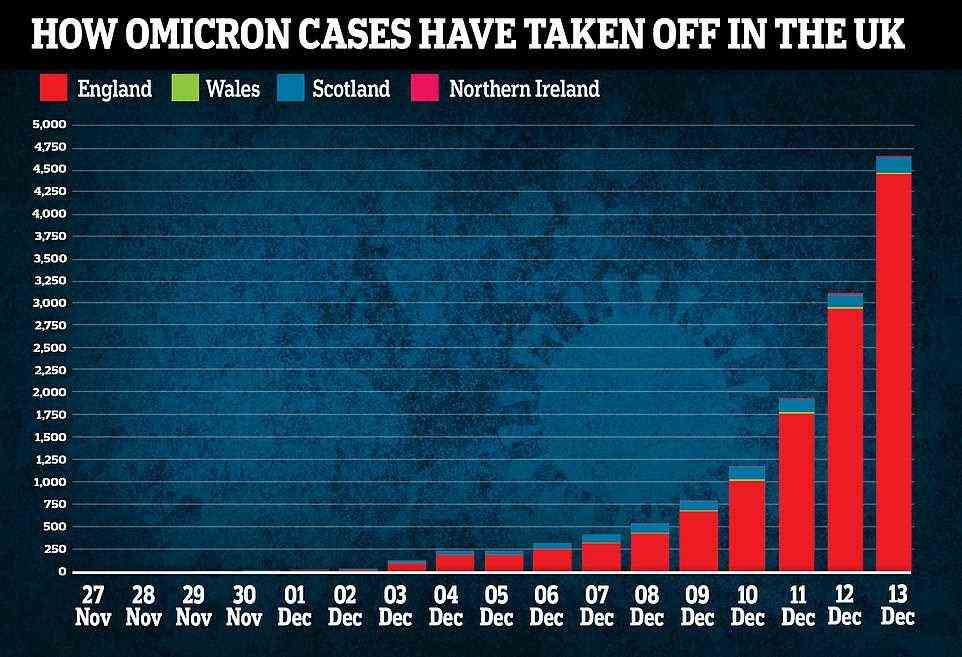
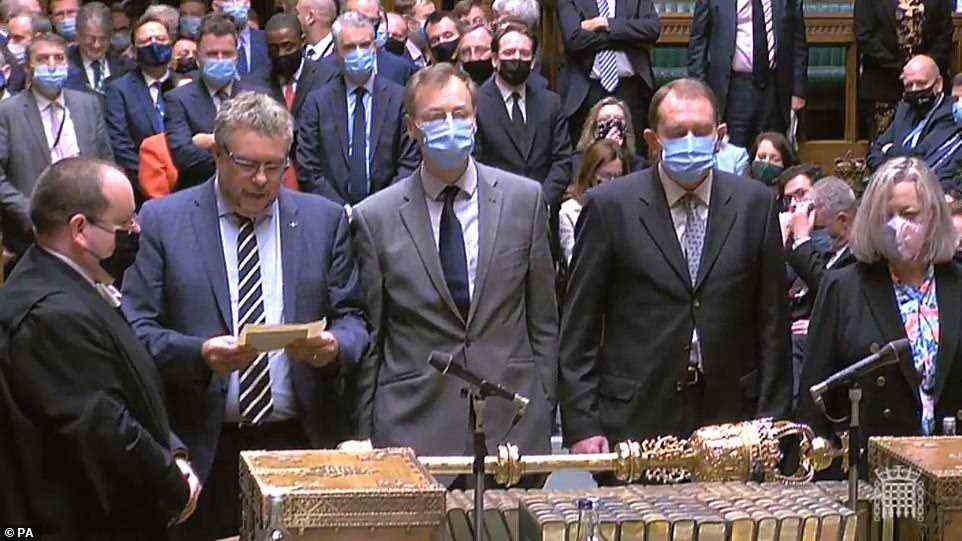
MPs announcing the result of a vote for Coronavirus regulations, in the House of Commons in London, as MPs have voted 441 to 41, majority 400, to approve regulations to extend the requirement to wear face coverings to more indoor spaces in England
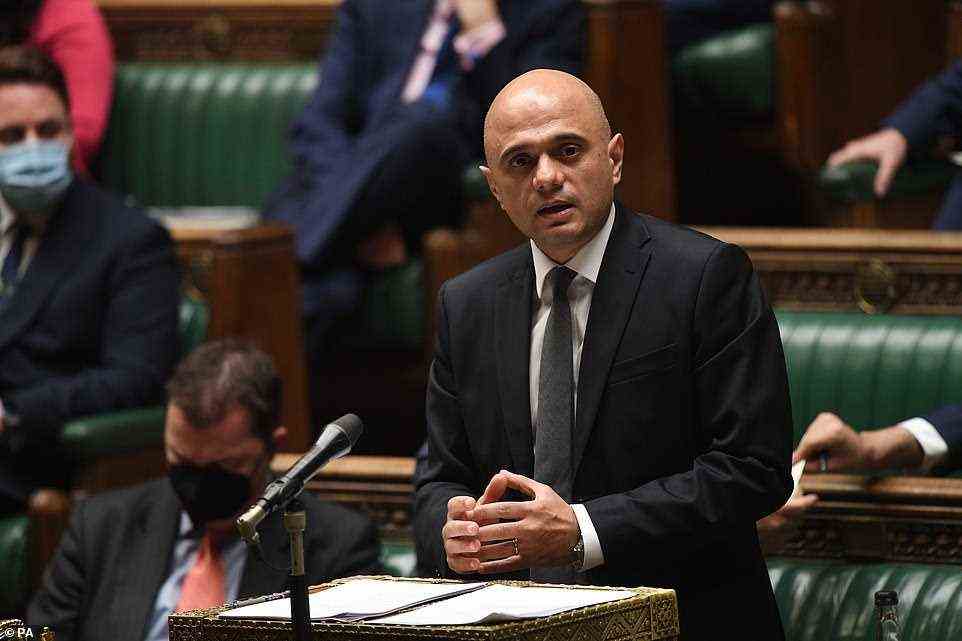
Health Secretary Sajid Javid updating MPs on the Government’s Covid plans in the House of Commons today
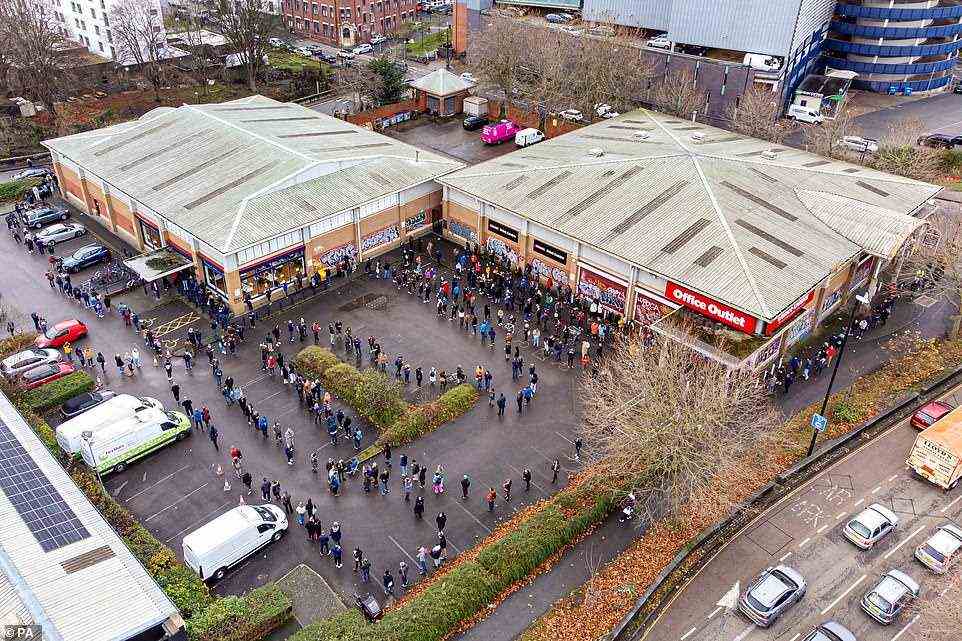
BRISTOL: People desperate to get a booster jab before Christmas queued up in a snaking line over a car park. Many are facing up to three hour waits to get their top-up doses
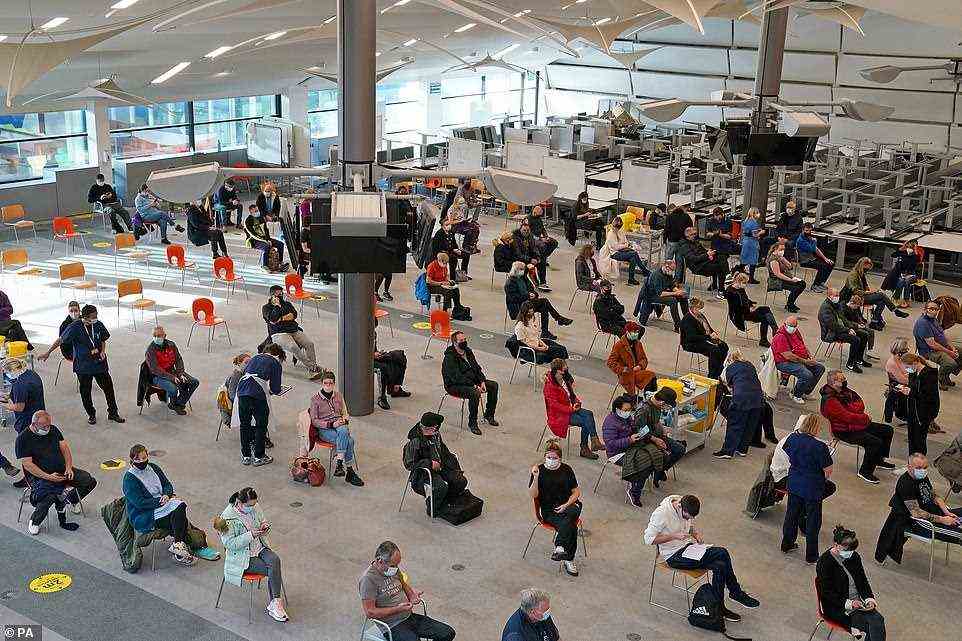
RAMSGATE, KENT: People pictured waiting to be called for their jab at a mass vaccination centre. Britain’s booster drive is being ramped up to beat the Omicron Covid variant





Meanwhile, in a letter to healthcare providers published late last night, NHS England said all patients in hospital beds should be discharged now if it is ‘safe’ to do so to make room for Omicron patients.
Nurses are being flown in from Spain and Greece to offer temporary assistance at hotels that are being converted into care sites over Christmas to help deal with the oncoming crisis, it was also revealed today.
But the NHS guidance did not stipulate how exactly patients would be deemed ‘medically fit’ enough to be discharged, leaving the decision in the hands of medics.
And there are fears returning elderly patients to care homes could put others at risk after former Health Secretary Matt Hancock’s decision not to test all residents before they were discharged last year was blamed for the deaths of thousands.
Care England, which represents the biggest private chains, told MailOnline the NHS must ensure all patients are ‘properly tested’ this time round and warned more staff are needed at some homes to make the scheme work.
It comes after Sajid Javid admitted even urgent operations may have to be cancelled in order to ramp up No10’s booster drive, which aims to offer a vital third dose to all adults by the end of the month.
Ministers have already warned anyone wanting to see their family doctor face-to-face for a ‘routine’ appointment will be forced to wait until the New Year so GPs can focus on delivering booster jabs. Doctors called for clear messaging on what is considered ‘urgent’, telling patients not to come in with rashes or common colds.
Cancer charities and patients’ rights groups today slammed the policy as a ‘hammer blow’ for those needing care, adding delays in seeing a GP can mean diagnoses are missed in the vital early stages of the disease. MacMillan said it fears the pivoting of the NHS to prioritising Covid will have ‘unintended consequences’.
The NHS surgery backlog is already at a record high of nearly 6million, with the crisis fuelled by hospitals being forced to cancel tens of thousands of operations during the pandemic.
Critics accused the NHS of having transformed into the ‘National Covid Service’ in the early days of the outbreak, sacrificing other elements of health care.
Meanwhile, the Omicron Covid variant spreading at a ferocious pace in the UK has become dominant in London barely two weeks after it was first detected, health chiefs revealed today.
Professor Kevin Fenton, the capital’s director of public health, said data suggested the super-strain was already behind at least one in every two new infections in the city, up from 44 per cent just yesterday.
As the country’s major transport hub, London quickly became England’s Omicron epicentre after South Africa first raised the alarm on November 24. It is thought to have been seeded in the capital by travellers flying into the UK.
The capital’s Covid infection rate has spiralled to its highest level since January when stringent curbs were in place, rising 55 per cent in a fortnight from 347 to 537 cases per 100,000 people.
And hospitalisations in the city have risen by 50 per cent over the same period, from 90 to 140 admissions a day on average. Deaths remain flat but it can take up to a month for fatalities to start rising due to the time it takes to fall seriously ill.
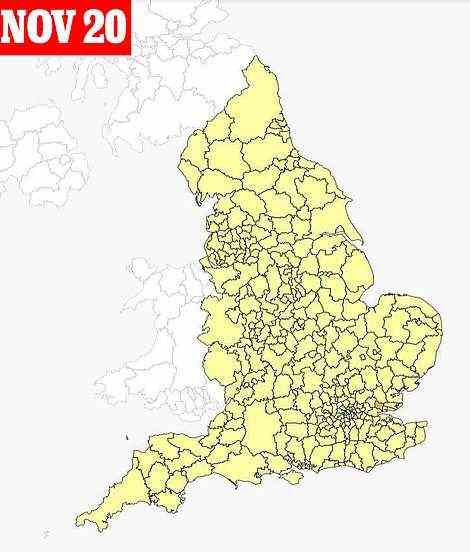
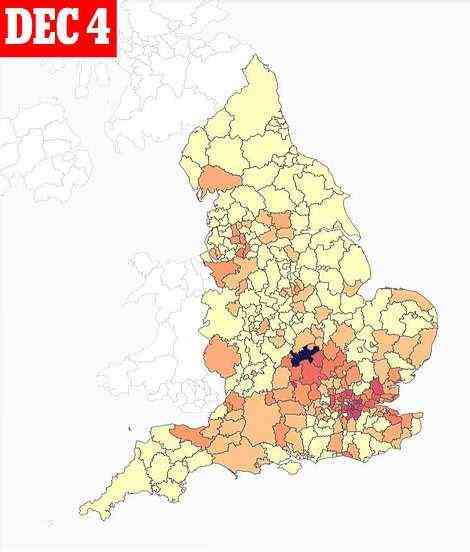
The above maps show areas where the Omicron Covid variant has been detected in England over the two weeks to November 20 (left), and to December 4 (right). Areas where the variant has been detected are not coloured yellow. It shows how it has gone from just one local authority, to about half of the country. Areas with darker colours have detected more cases
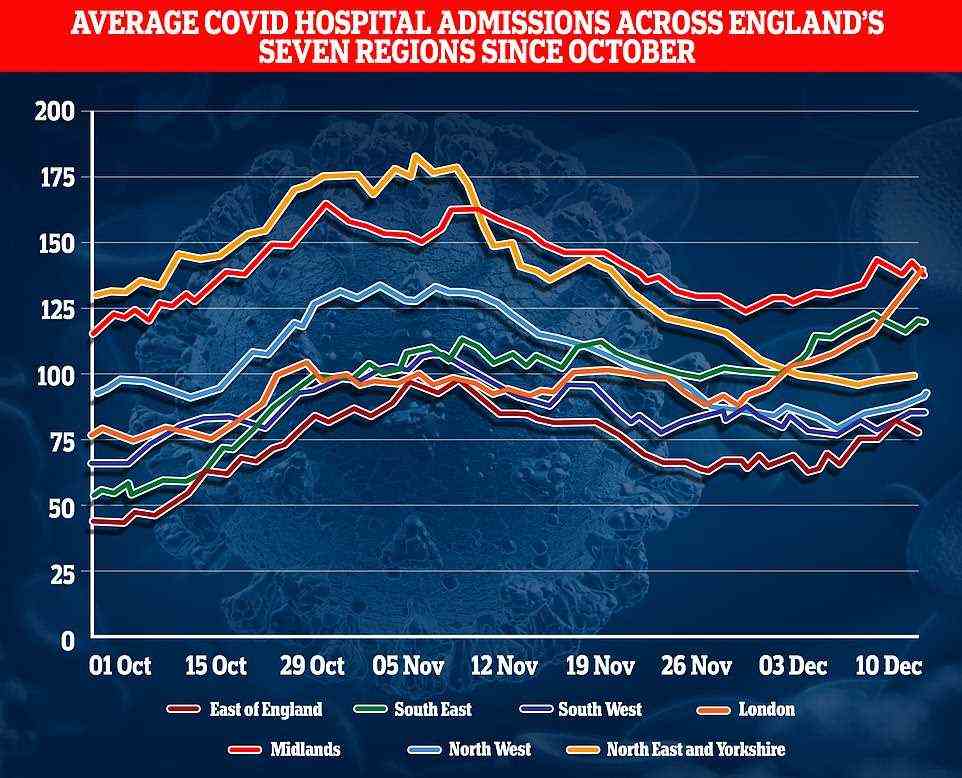
The above graph shows the seven-day average for hospital admissions in different regions of England. It reveals that in London (orange) there has been a steady increase
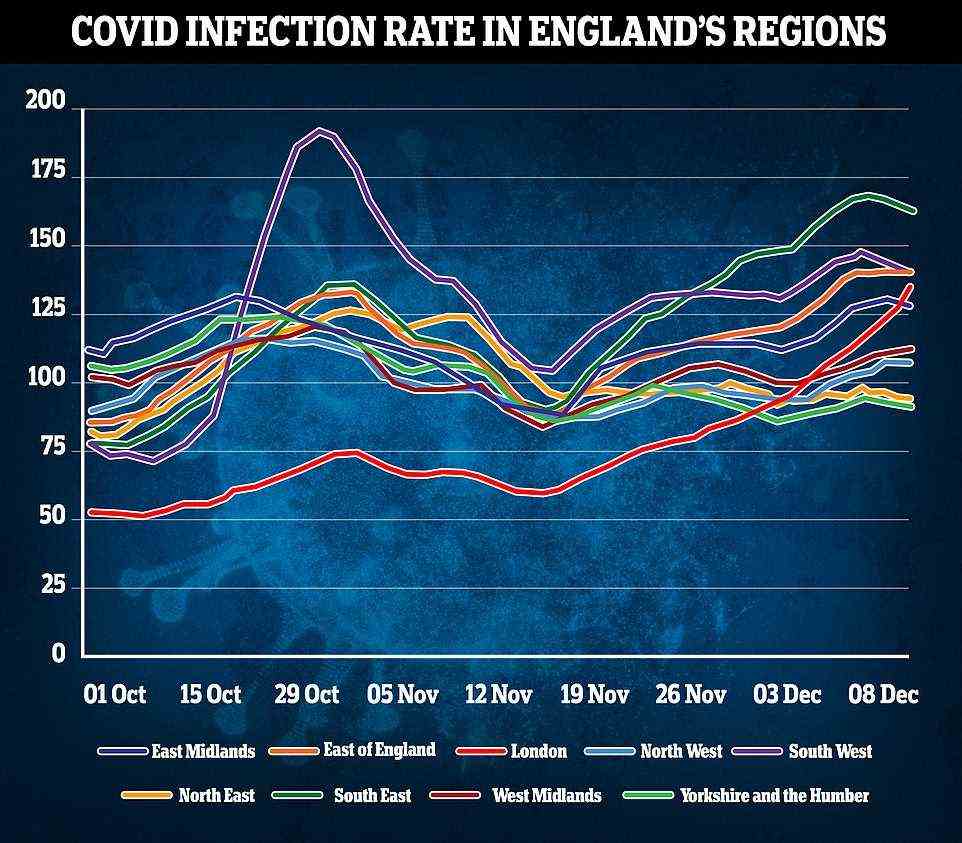
This graph shows the Covid infection rate per 100,000 people in England’s regions. It also shows there has been a rapid uptick in London (red) while cases remain largely flat in other regions
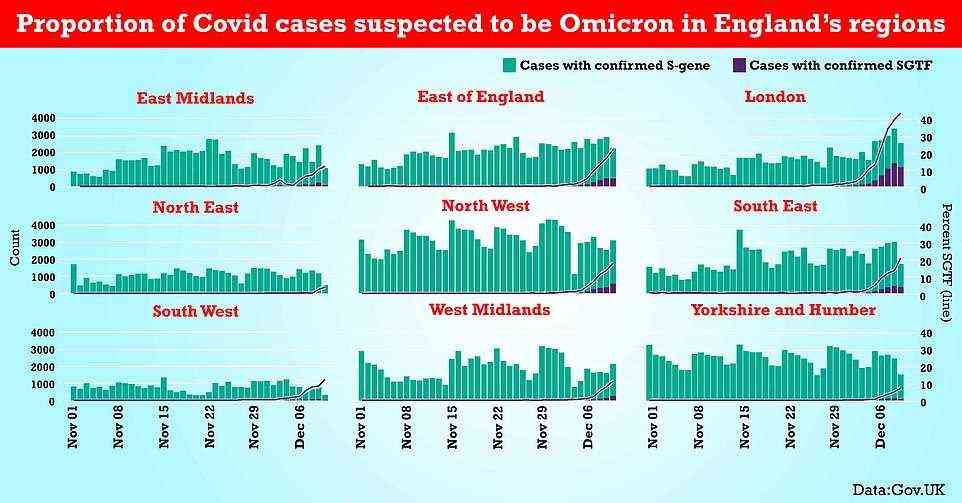
The above graph shows how Omicron cases are rising across England’s regions. PCRs search for three specific genes to tell whether someone has Covid, but with Omicron one of the genes is so mutated – the S-gene – that it does not show up with the tests. Cases with this gene missing are coloured purple above, with the graph showing their numbers quickly increasing
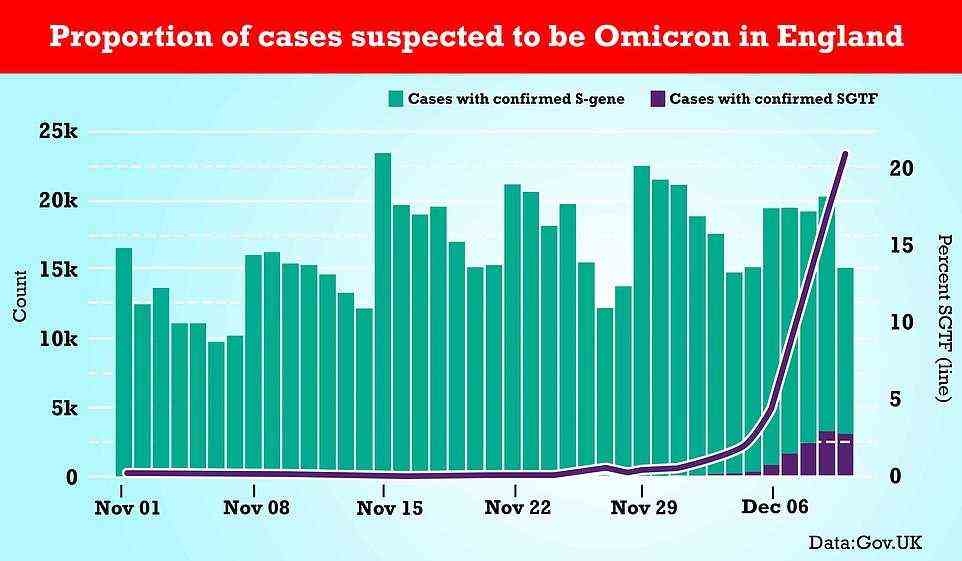
The above graph shows the proportion of cases detected that did and did not have a confirmed S-gene. PCRs search for three specific genes to tell whether someone has Covid, but with Omicron one of the genes is so mutated – the S-gene – that it does not show up. This allows scientists to quickly tell which cases are likely Delta (green) and Omicron (purple)
Scientists and health leaders today called for tighter pandemic restrictions to help hold the Omicron case tsunami at bay, stating the beleaguered Covid booster programme will not be enough.
Experts called for compulsory mask wearing, social distancing enforcement in the hospitality sector, and for Britons to dramatically reduce the number of people they meet in person.
The experts were giving evidence to MPs from All-Party Parliamentary Group on Coronavirus today.
British Medical Association chair Chaand Nagpaul was one of those who called for great restrictions.
‘It makes no sense that staff in hospitality don’t need to wear a mask, a waiter serving customers in a crowded restaurant is just as able to transmit the virus. Make that mandatory now,’ he said.
‘Have specifications on physical distancing, having a restaurant, or a club, or a bar, or a pub with people crowded next to each other doesn’t make sense.
‘You have to have a policy that is not just about boosters…that does mean going further than some of the restrictions in Plan B.’
SAGE advisor and professor psychology Stephen Reicher also argued that boosters will not be enough to stem the Omicron tide.
‘We need to get cases down now, while we all agree we need to get boosters, number one it will take a number of weeks to give people those boosters, number one it will take a couple of weeks for the effect of those boosters to kick in and if we were to do nothing now by the then the cases will be catastrophically high,’ he said.
Katherine Henderson, president of the Royal College Emergency Medicine said her biggest worry was the focus on the Covid booster programme would drag much needed clinical staff away from hospital wards.
‘It isn’t like we’ve got a whole load of blow-up vaccinators in a cupboard somewhere that we’ve been keeping on standby for this situation,’ she said.
And Elaine Thorpe, an Intensive Care Unit matron at University College London Hospitals NHS Foundation Trust told MPs that staff were already dreading what was to come.
‘You can see it in the eyes of the doctors and the nurses and the physios, they are terrified of having to do that again,’ she said.
Nationally, Omicron is behind one in every five cases but is expected to outstrip Delta before the New Year. For comparison, it took Delta almost two months to take over from the Alpha variant. Omicron is also spreading very quickly in Scotland and South Northamptonshire, data shows.
A spokesman for London’s mayor suggested today they would back controversial local lockdown restrictions in the capital, saying it was better to ‘act now’ rather than wait for the virus to spiral out of control.
But Tory representatives called on ministers to rely on ‘strong vaccine protection’ and ramp up the booster drive, rather than curb people’s daily lives.
Nicola Sturgeon today told Scots they could no longer mix in groups bigger than three households, and said social distancing was to return in shops and pubs because of surging Omicron numbers there. But the First Minister said the rule would be relaxed for Christmas Day and there was no reason to cancel plans.
The surging cases in the capital and calls for more restrictions have echoes of last winter when London was the first place to be locked down in the run up to Christmas.
It comes as a major study today suggested that two doses of Pfizer’s vaccine still provides 70 per cent protection against hospital admission and death from Omicron, compared to 93 per cent for Delta.
The first real-world study in South Africa also estimated the risk of hospitalisation was a fifth lower than with Delta and 29 per cent lower than the original virus.
The findings lend weight to the theory that the ultra-infectious variant is weaker than previous strains, something which doctors on the ground in South Africa have been claiming for weeks.
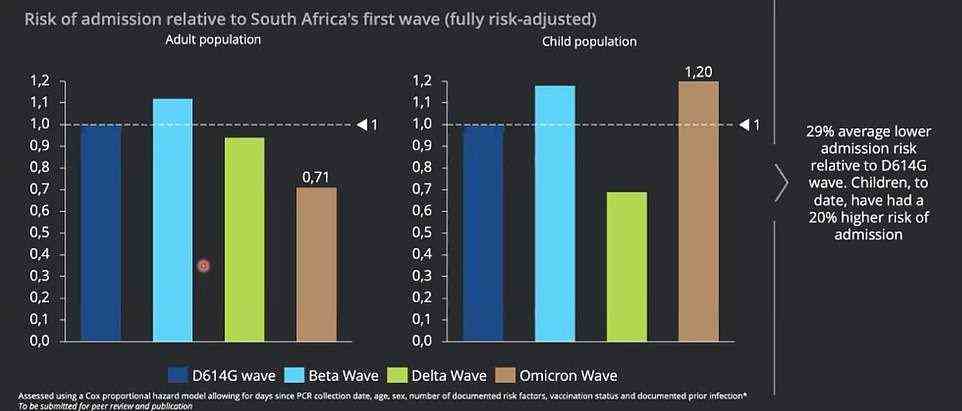
Officials who looked at 78,000 Omicron cases in the past month found t he risk of hospitalisation was a fifth lower than with Delta (in green) and 29 per cent lower than the original virus (dark blue). Omicron is shown in brown and the original South African ‘Beta’ variant in light blue. Children appeared to have a 20 per cent higher risk of hospital admission with complications during the new wave than the initial outbreak, despite the numbers still being tiny
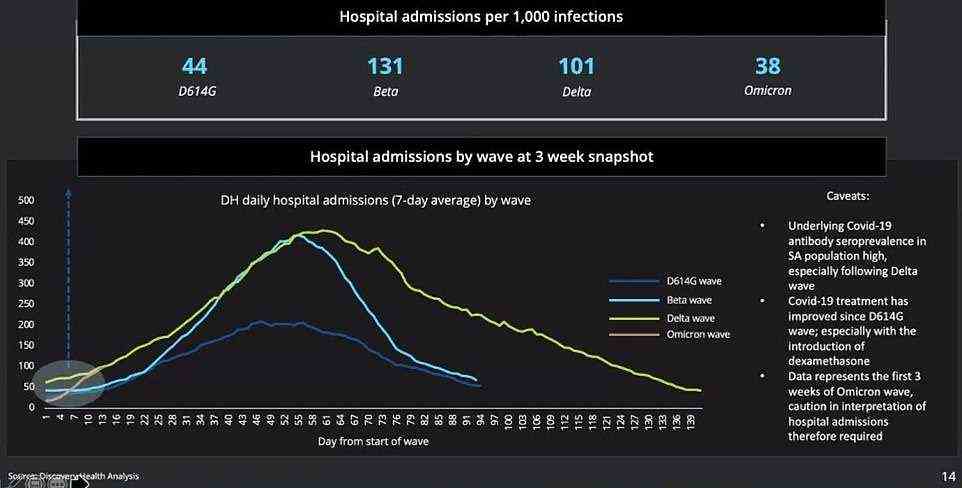
As a crude rate, Omicron is currently causing a third fewer hospital admissions than Delta did during its entire wave — 38 admissions per 1,000 Omicron cases, compared to 101 per 1,000 for Delta
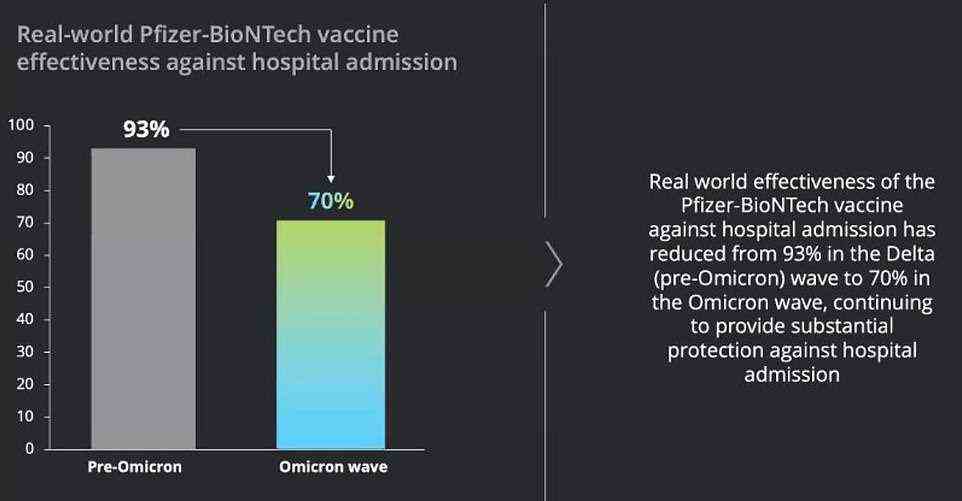
The study also found that two doses of Pfizer’s vaccine still provides 70 per cent protection against hospital admission or death from Omicron, compared to 93 per cent for Delta
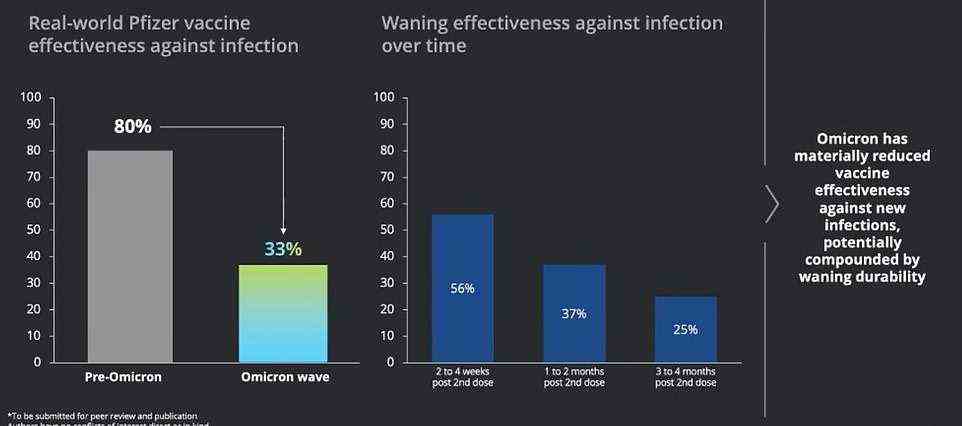
Waning immunity from two Pfizer doses was found to offer just 33 per cent protection against Omicron infection, explaining why the country has seen a meteoric rise in case numbers
Nicola Sturgeon re-introduced social distancing and asked Scots to cut down on socialising in the run up to Christmas today.
Pubs, restaurants and shops will have to take measures to avoid crowding and queues, the First Minister told Holyrood.
Additionally she asked Scots to limit indoor mixing to just three households. While the advice will not be enforceable in law, Ms Sturgeon announced that allowing staff to work from home where possible will again become a legal duty on employers.
Ms Sturgeon confirmed that she was not seeking to put restrictions on festive events at Christmas itself, although she added that ‘keeping your celebrations as small as family circumstances allow is sensible’.
‘My key request today is this: before and immediately after Christmas, please minimise your social mixing with other households as much as you can,’ she told the Scottish Parliament.
‘However, if you do plan on socialising, either at home or in indoor public places, we are asking that you limit the number of households represented in your group to a maximum of three. And make sure you test before you go.’
She also lashed out at Boris Johnson, complaining that it was ‘not acceptable’ that there was no additional funding yet available from the UK Government to support businesses affected by the measures she is introducing.
The changes – which could well be followed by similar moves in Wales – will further increase the pressure on Boris Johnson in England, with London, like Scotland, an omicron hotspot.
Calls have been made for the introduction of further restrictions in the capital, with the super mutant variant now responsible for half of cases.
The city is still the region of England with the fastest-growing Covid outbreak, according to Government data, with cases growing by up to 48 per cent a week in the worst-hit boroughs.
NHS leaders said No10 needs to be prepared to introduce stricter curbs than the current Plan B if Omicron is on the brink of overwhelming the NHS.
Mr Johnson warned his Cabinet this morning that a ‘huge spike’ of Omicron is coming, according to Downing Street.
But the Prime Minister already faces a Tory rebellion over introducing mandatory face masks and vaccine passports for some venues, measures already in place in Scotland.
Scores of Conservatives have vowed to defy the government whip when new regulations rubber-stamping Covid passes for nightclubs and major events, mandatory vaccination for health staff, and mask use come before the Commons.
Dominic Raab risked inflaming the tensions in interviews this morning as he dismissed ‘overstated’ criticism about the measures to combat the Omicron strain.
But the scale of the rebellion means the embattled PM will almost certainly have to rely on Labour to get the measures through – despite in theory having an 80-strong Commons majority. Several ministerial aides are threatening to quit rather than back the government.
Ministers are said to be examining plans for a further round of restrictions in England that would push it closer towards a lockdown and are sure to watch Ms Sturgeon’s announcement with interest and trepidation.
Meanwhile Britain’s booster drive to beat the Omicron super-variant has been mired in chaos after more than 4.4million attempts were made to book top-up shots on the NHS website and furious GPs warned they had run out of doses.
Health chiefs said 545,000 appointments were secured by 8pm last night, even after the website crashed because so many people logged on. This morning Britons were stuck in up to an hour long queues.
But GPs complained they would not have enough jabs for everyone after being given until 9am to order stocks to meet Boris Johnson’s December 31 ‘boosted or bust’ deadline.
Omicron becomes DOMINANT in London: Capital’s hospital admissions have risen 50% since variant first emerged and graphs show how quickly it has taken off in the country at large
The Omicron Covid variant spreading at a ferocious pace in the UK has become dominant in London barely two weeks after it was first detected, health chiefs revealed today.
Professor Kevin Fenton, the capital’s director of public health, said data suggested the super-strain was already behind at least one in every two new infections in the city, up from 44 per cent just yesterday.
As the country’s major transport hub, London quickly became England’s Omicron epicentre after South Africa first raised the alarm on November 24. It is thought to have been seeded in the capital by travellers flying into the UK.
The capital’s Covid infection rate has spiralled to its highest level since January when stringent curbs were in place, rising 55 per cent in a fortnight from 347 to 537 cases per 100,000 people.
And hospitalisations in the city have risen by 50 per cent over the same period, from 90 to 140 admissions a day on average. Deaths remain flat but it can take up to a month for fatalities to start rising due to the time it takes to fall seriously ill.
Nationally, Omicron is behind one in every five cases but is expected to outstrip Delta before the New Year. For comparison, it took Delta almost two months to take over from the Alpha variant. Omicron is also spreading very quickly in Scotland and South Northamptonshire, data shows.
A spokesman for London’s mayor suggested today they would back controversial local lockdown restrictions in the capital, saying it was better to ‘act now’ rather than wait for the virus to spiral out of control.
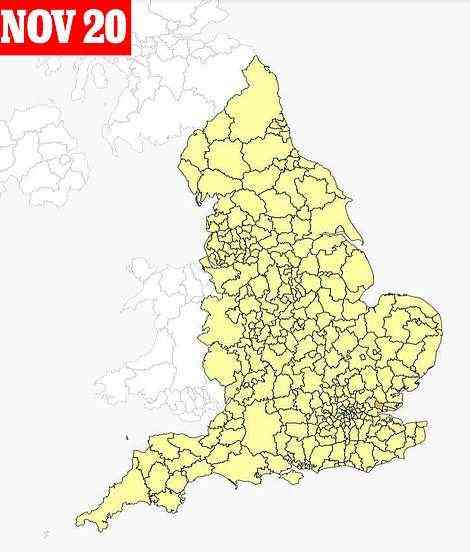
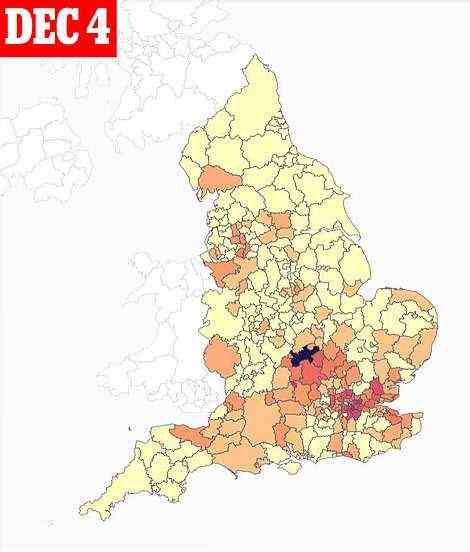
The above maps show areas where the Omicron Covid variant has been detected in England over the two weeks to November 20 (left), and to December 4 (right). Areas where the variant has been detected are not coloured yellow. It shows how it has gone from just one local authority, to about half of the country. Areas with darker colours have detected more cases
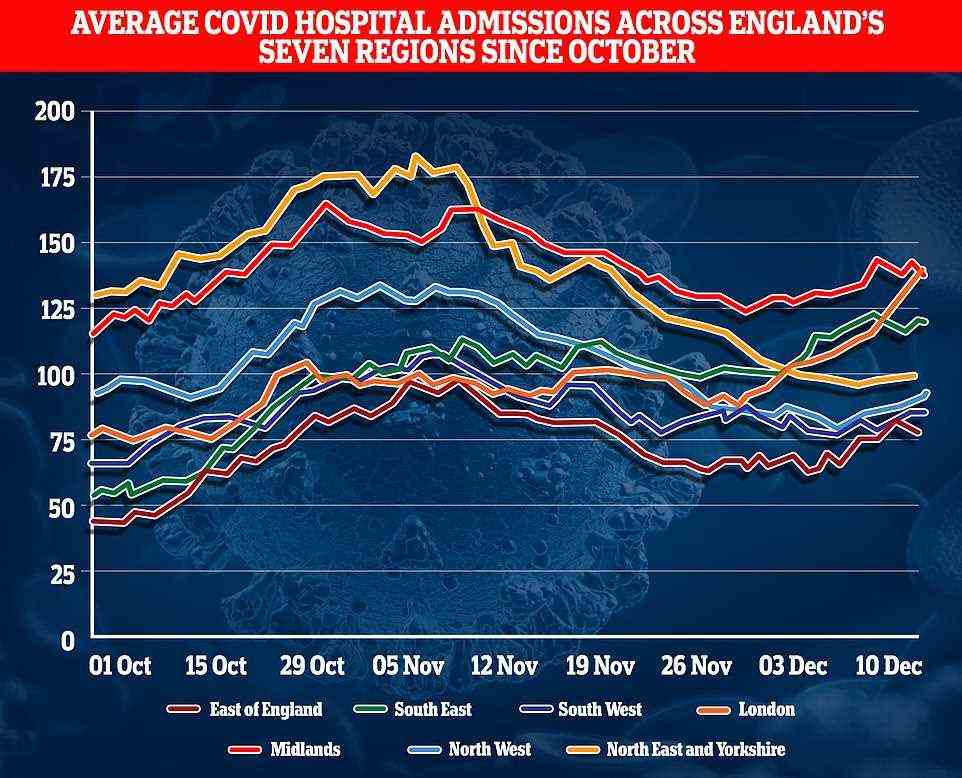
The above graph shows the seven-day average for hospital admissions in different regions of England. It reveals that in London (orange) there has been a steady increase
But Tory representatives called on ministers to rely on ‘strong vaccine protection’ and ramp up the booster drive, rather than curb people’s daily lives.
Nicola Sturgeon today told Scots they could no longer mix in groups bigger than three households, and said social distancing was to return in shops and pubs because of surging Omicron numbers there. But the First Minister said the rule would be relaxed for Christmas Day and there was no reason to cancel plans.
The surging cases in the capital and calls for more restrictions have echoes of last winter when London was the first place to be locked down in the run up to Christmas.
It comes as a major study today suggested that two doses of Pfizer’s vaccine still provides 70 per cent protection against hospital admission and death from Omicron, compared to 93 per cent for Delta.
The first real-world study in South Africa also estimated the risk of hospitalisation was a fifth lower than with Delta and 29 per cent lower than the original virus.
The findings lend weight to the theory that the ultra-infectious variant is weaker than previous strains, something which doctors on the ground in South Africa have been claiming for weeks.
Experts accuse Sajid Javid and health officials of blatant scare-mongering for claim that at least 200,000 Britons are catching Omicron each day
Sajid Javid and his top health advisers were today accused of scare-mongering after clarifying that gloomy models do estimate that 200,000 Britons could be catching Omicron every day.
The Health Secretary last night told MPs that daily Covid infections were thought to have breached the 200,000 mark.
But his comments, made in a statement discussing the threat of Omicron, sparked immediate confusion over whether the figure was relating to the virus as a whole, or specifically just the super-mutant variant.
Department of Health insiders last night told The Telegraph that Mr Javid was correct to imply Omicron cases had hit 200,000 a day.
And the UK Health Security Agency, which made the grisly estimate, today revealed the maths used to make the claim. Today’s toll would be in the region of 300,000, by the team’s own calculations.

But experts today questioned the pessimistic projection, with one of the country’s most eminent statisticians calling the calculation into doubt.
Professor Sir David Spiegelhalter, from the University of Cambridge, told MailOnline: ‘To get the figure of 200,000, they would need to assume a doubling time of 1.75 days, or a higher starting point.
‘It is very frustrating, to put it mildly, that such high-profile and surprising numbers are given without any publicly available justification.’
Professor of medicine and consultant oncologist Karol Sikora added to the criticism, stating the Government was deliberately ‘scaremongering’ the population into getting booster jabs.
‘It’s alarmist and all part of a deliberate PR ploy to get people the booster,’ he said.
‘It’s not a bad idea to get the booster, but you could see yesterday the system creaked under the pressure.’
Care bosses warn homes won’t have space to deal with NHS kicking out ‘as many patients as possible’ and demand health chiefs test EVERYONE discharged to avoid devastating repeat of first wave
Care bosses have warned homes will not have enough staff to deal with NHS orders for hospitals to discharge as many patients as ‘soon as practically possible’ to handle the predicted Omicron surge.
In a letter to regional bosses published late last night, NHS England ruled all patients occupying hospital beds who don’t ‘need’ one be sent to care homes, hospices and hotels if it is ‘safe’ to do so.
Hospitals are on red alert in the wake of shocking modelling by No10’s scientists that warned admissions could exceed levels seen during the darkest days of the nation’s second wave last January, when 4,000 infected patients were needing medical care every day.
But the NHS guidance did not stipulate how patients would be deemed ‘medically fit’ enough to be discharged, leaving the decision in the hands of medics.
And there are fears returning elderly patients to care homes could put others at risk, after former Health Secretary Matt Hancock’s decision not to test all residents before they were discharged last year was blamed for the deaths of thousands.
Care England, which represents the biggest private chains in the country, told MailOnline the NHS must ensure all patients are ‘properly tested’ this time round and warned more staff are needed at some homes to make the scheme work.
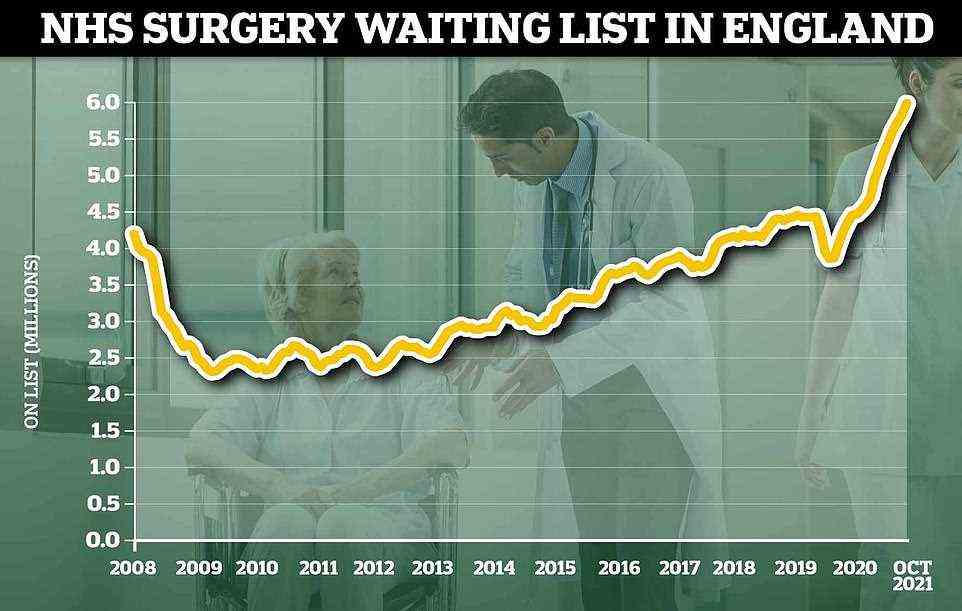
The NHS waiting list for routine hospital treatment in England has reached 5.83million, official data reveals marking the eleventh month in a row that the figure has hit a record high. Some 1.6million more Britons were waiting for elective surgery — such as hip and knee operations — at the end of September compared to the start of the pandemic
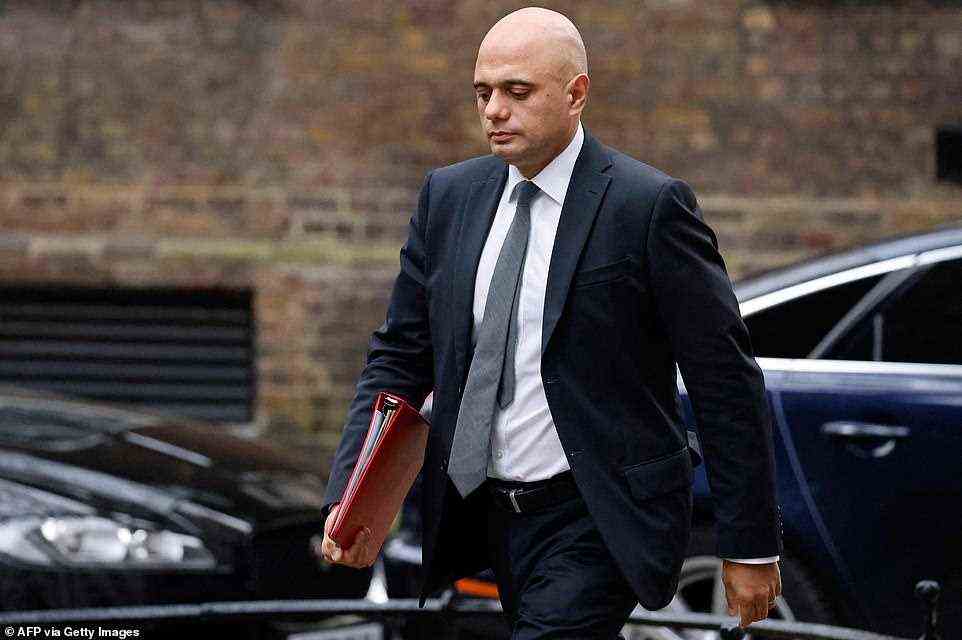
The NHS last night ordered hospitals to discharge all healthy patients off wards and into hotels to handle the predicted surge in Covid patients because of the Omicron variant this winter. Sajid Javid (pictured today on Downing Street ahead of a cabinet meeting) admitted even urgent operation may have to be cancelled in order to ramp up No10’s booster drive, which aims to offer a vital third dose to all adults by the end of the month
Professor Martin Green, its chief executive, said: ‘If the NHS intend to discharge more people into care homes they must ensure that they are all properly tested and that the care homes are properly funded to do this work on a national tariff.
‘There is an issue about staffing in the care sector, so the NHS may well have to provide some staff in order to make this discharge scheme work.’
Nurses are being flown in from Spain and Greece to offer temporary assistance at hotels that are being converted into care sites over Christmas to help deal with the oncoming crisis, it was also revealed today.
It comes after Sajid Javid admitted even urgent operations may have to be cancelled in order to ramp up No10’s booster drive, which aims to offer a vital third dose to all adults by the end of the month.
Ministers have already warned anyone wanting to see their family doctor face-to-face for a ‘routine’ appointment will be forced to wait until the New Year so GPs can focus on delivering booster jabs. Doctors called for clear messaging on what is considered ‘urgent’, telling patients not to come in with rashes or common colds.
Cancer charities and patients’ rights groups today slammed the policy as a ‘hammer blow’ for those needing care, adding delays in seeing a GP can mean diagnoses are missed in the vital early stages of the disease. MacMillan said it fears the pivoting of the NHS to prioritising Covid will have ‘unintended consequences’.
The NHS surgery backlog is already at a record high of nearly 6million, with the crisis fuelled by hospitals being forced to cancel tens of thousands of operations during the pandemic.
Critics accused the NHS of having transformed into the ‘National Covid Service’ in the early days of the outbreak, sacrificing other elements of health care.

